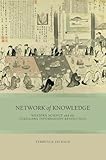Network of Knowledge : Western Science and the Tokugawa Information Revolution / Terrence Jackson.
Material type: TextPublisher: Honolulu : University of Hawaii Press, [2016]Copyright date: 2016Description: 1 online resource (208 p.) : 9 b&w illustrations, 1 mapContent type:
TextPublisher: Honolulu : University of Hawaii Press, [2016]Copyright date: 2016Description: 1 online resource (208 p.) : 9 b&w illustrations, 1 mapContent type: - 9780824853594
- 610.69/50952 23
- R626.O84 J33 2016eb
- online - DeGruyter
| Item type | Current library | Call number | URL | Status | Notes | Barcode | |
|---|---|---|---|---|---|---|---|
 eBook
eBook
|
Biblioteca "Angelicum" Pont. Univ. S.Tommaso d'Aquino Nuvola online | online - DeGruyter (Browse shelf(Opens below)) | Online access | Not for loan (Accesso limitato) | Accesso per gli utenti autorizzati / Access for authorized users | (dgr)9780824853594 |
Browsing Biblioteca "Angelicum" Pont. Univ. S.Tommaso d'Aquino shelves, Shelving location: Nuvola online Close shelf browser (Hides shelf browser)

|

|

|

|

|

|

|
||
| online - DeGruyter Unearthing the Polynesian Past : Explorations and Adventures of an Island Archaeologist / | online - DeGruyter A Garden of Marvels : Tales of Wonder from Early Medieval China / | online - DeGruyter Perfumed Sleeves and Tangled Hair : Body, Woman, and Desire in Medieval Japanese Narratives / | online - DeGruyter Network of Knowledge : Western Science and the Tokugawa Information Revolution / | online - DeGruyter Traces of the Sage : Monument, Materiality, and the First Temple of Confucius / | online - DeGruyter Exile in Colonial Asia : Kings, Convicts, Commemoration / | online - DeGruyter Women Pre-Scripted : Forging Modern Roles through Korean Print / |
Frontmatter -- Contents -- Acknowledgments -- Introduction The World of Dutch Studies and an Information Revolution -- Chapter One Ōtsuki Gentaku: Network Facilitator -- Chapter Two Creating Community: The Culture of Early Modern Salons -- Chapter Three Bows and Laughs: The Civil Egalitarianism of Salons -- Chapter Four Training / Reproducing the Network: Private Academies -- Chapter Five A National Network: Travel and Correspondence -- Chapter Six The Network in Action: Book Circulation and Publication -- Chapter Seven Politicizing the Network: Civil Society in the Meiji Period -- Conclusion The Historical Significance of Community -- Notes -- Bibliography -- Index -- About the Author
restricted access online access with authorization star
http://purl.org/coar/access_right/c_16ec
Nagasaki during the Tokugawa (1603–1868) was truly Japan's window on the world with its Chinese residences and Deshima island, where Western foreigners, including representatives of the Dutch East India Company, were confined. In 1785 Ōtsuki Gentaku (1757–1827) journeyed from the capital to Nagasaki to meet Dutch physicians and the Japanese who acted as their interpreters. Gentaku was himself a physician, but he was also a Dutch studies (rangaku) scholar who passionately believed that European science and medicine were critical to Japan's progress. Network of Knowledge examines the development of Dutch studies during the crucial years 1770–1830 as Gentaku, with the help of likeminded colleagues, worked to facilitate its growth, creating a school, participating in and hosting scholarly and social gatherings, and circulating books. In time the modest, informal gatherings of Dutch studies devotees (rangakusha), mostly in Edo and Nagasaki, would grow into a pan-national society.Applying ideas from social network theory and Bourdieu's conceptions of habitus, field, and capital, this volume shows how Dutch studies scholars used networks to grow their numbers and overcome government indifference to create a dynamic community. The social significance of rangakusha, as much as the knowledge they pursued in medicine, astronomy, cartography, and military science, was integral to the creation of a Tokugawa information revolution—one that saw an increase in information gathering among all classes and innovative methods for collecting and storing that information. Although their salons were not as politically charged as those of their European counterparts, rangakusha were subversive in their decision to include scholars from a wide range of socio-economic backgrounds. They created a cultural society of civility and play in which members worked toward a common cultural goal. This insightful study reveals the strength of the community's ties as it follows rangakusha into the Meiji era (1868–1912), when a new generation championed values and ambitions similar to those of Gentaku and his peers.Network of Knowledge offers a fresh look at the cultural and intellectual environment of the late Tokugawa that will be welcomed by scholars and students of Japanese intellectual and social history.
Mode of access: Internet via World Wide Web.
In English.
Description based on online resource; title from PDF title page (publisher's Web site, viewed 20. Nov 2024)


